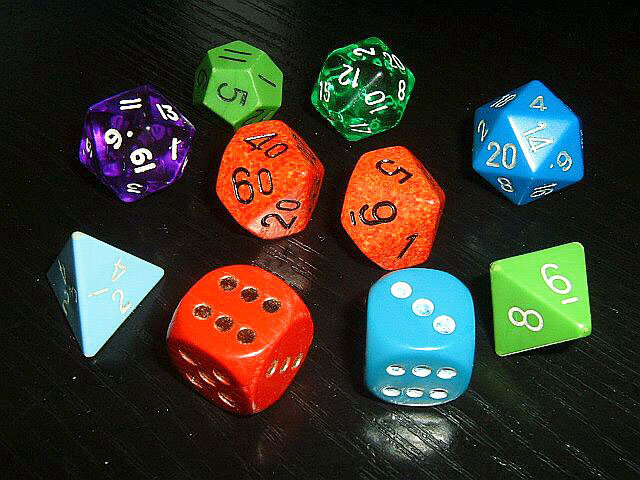Why Roll? A Question of Dice

At a party three years ago that I was introduced to another games blogger who posed the question, "Why do the vast majority of role-playing games involve dice?" It was a good question, and since the topic of this week's installment of d-Infinity Live! is all about dice, I would like to share my answer.
Last week saw the great concentration of gamers that is GenCon. Four days of intense gaming, fellowship amongst players, and deal making and breaking amongst the leaders of this most creative of industries. And there were quite a few parties as well. It was at one such party three years ago that I was introduced to another games blogger who posed the question, "Why do the vast majority of role-playing games involve dice?" It was a good question, and since the topic of this week's installment of d-Infinity Live! is all about dice, I would like to share my answer.
Why do RPGs use dice?
Historical Precedent. Dungeons & Dragons, the trunk of the great family tree of role-playing, was and still is a game saturated with dice. But go back further, and you find dice have been a part of gaming in general for ages. The two are intrinsically linked. Archeological evidence shows dice based gaming, gambling and games of chance in their purest forms, go back as far as 3000 BC. It almost makes the question of why we use dice moot. We always have, we always will. It is not that any particular game is arbitrarily married to dice, but that dice and gaming are practically one and the same.
Practicality. A role-playing game is not like other games, where every rule functions together like a sophisticated machine. Role-playing games, based as their are around creating stories with characters in possession of free will, are inherently unpredictable. Remove dice from the game, and the GM, the interpreter of the rules, must make countless judgement calls, leaving it to him to decide who succeeds, who fails, how much damage is done, etc. I know from experience that the wholly random outcomes generated by dice are fairer that I, as a human, can ever be. By leaving these outcomes to chance a greater sense of fair play is maintained. One can accuse the GM of playing favorites, but not the dice. And the dice get the job of generating outcomes done in a moment, whereas a GM may sit and think and agonize for quite some time whenever such a judgment call is required.
Enjoyment. There is something satisfyingly primal about taking a hand full of dice, feeling them clatter in your grip, and sending them loose to roll across the table. Role-playing is primarily and mental and auditory exercise. But when dice are involved we engage our other senses. The game becomes tactile, more real, and therefor a more intense experience.
That is why we use dice.



